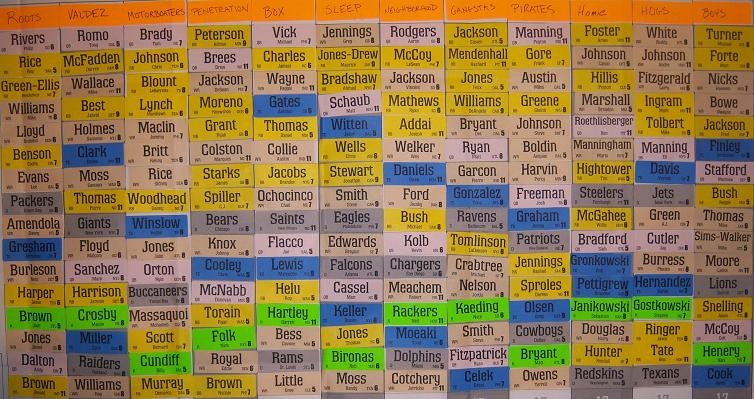How Are Fantasy Points Calculated?

Fantasy soccer is a well-loved game where the participants assemble a team made of pre-existing members in an effort to gather as many points as they can to win. These points are based on the players in the team and their actual statistical performance, and their contribution on the field.
These points depend significantly on their performance and can be gained or deducted based on the player’s performance. The player can earn points if they play in a match for at least 60 minutes, score a goal, have a clean sheet, etc. They can also lose points if they concede a goal, receive a yellow or red card, miss a penalty kick, etc.
Types of Fantasy Soccer Leagues Based on Points
There are a wide variety of fantasy soccer leagues that you can play online. Each of these leagues has some variations, but almost all of them fall under one of these three categories.
Head to Head Leagues
These leagues are one of fantasy leagues’ most common point scoring systems. When you are faced with your opponent, the winner will be the one with the most points at the end of the week’s games.
Therefore, the teams who have the best record, or the most points, will be able to advance to the playoffs at the end of the season. It is easy to understand and relatively simple for most fantasy players.
Total Point Leagues
These leagues use a point score system that includes calculating the points a team earns or loses on an ongoing basis. The total of each team then determines their standing among other teams.
In this type of scoring system, the team positions are constantly shifting. It is a bit more nuanced, and instead of waiting till the end of a week, you know when you need to start worrying about your points and overall standing.
All Play Leagues
All Play Leagues has the teams play each other from week to week. Usually, the league includes ten teams, and the scoring is done quite differently from other kinds of leagues.
The highest scoring team has 9-0, and the second highest has 8-1, and so on.
Scoring
Usually, when playing in a standard fantasy league, the eight players earn points based on the statistics based on their performance in actual real-life games. When these fantasy points are added together, they form the team’s weekly score.
The points included in the week’s scores do not include the bench players. The winner is the team who has earned the most points in a week.
The number of points awarded for each achievement also varies between different games. This is due to how the website hosts the fantasy games award points, and some focus intensely on assists and goal scoring. Therefore, the points earned by a player in one game can be vastly different in a fantasy league for another website.
Due to this reason, the value of a player can also vary from real-life football. Some fantasy football games changed up their scoring because of this as well. Now, they place greater importance on the actual player performance instead of focusing on assists and goals.
One example of a sophisticated scoring system is that of Oulala Fantasy Football. It has 70 different scoring criteria, which make use of a matrix of almost any action the player can perform. Due to the 70 criteria, a total of 275 dependent activities can occur based on each player’s position on the field.
Many detailed actions can also gain and lose the player points. These include corners won, successful dribbles, provoking the offside, shots on and off target, etc. However, this game has ceased to exist as of 2018.
Points Gained or Lost
In the Fantasy Premier League, a player can earn 1 point for playing for 60 minutes, for every three shots saved if they are a goalkeeper and if they are a midfielder and have a clean sheet.
A player can earn 2 points if they play for more than 60 minutes, excluding any stoppage time. They can earn 3 points if they assist for a goal. A player can earn four points if a forward scores a goal or if a goalkeeper or defender has a clean sheet.
Five points are awarded if a midfielder scores a goal or if there is a penalty save. The player can earn 6 points if a goalkeeper or defender scores a goal.
A player will lose a point for each yellow card and for every two goals conceded by a goalkeeper or defender. A player will lose two points for each penalty miss and each own goal, and three points will be lost for every red.
Usually, clean sheet points are not affected if the player has been substituted before a goal is conceded. However, they should have played for at least 60 minutes.
When awarding assists, points are only given to the player from the scoring team, making the final pass before a goal is scored. The points are also awarded regardless of the fact that the assist was intentional or unintentional. If it was intended, the player created a chance for a goal to be scored. If it was unintentional, the player might have had to dribble the ball, or there was an accidental touch or a shot that may have created a chance.
However, there are many nuances to the assists being awarded. Suppose a player from the opposing team touches the ball after the final pass has been made, significantly changing the direction it was going. In that case, points for assist are not rewarded.
Furthermore, assist points are not awarded if there is a touch by an opposing outfield player, a defensive error followed by an opposing outfield player and if the goalscorer loses the ball and regains possession.
In the case of rebounds, if a shot on a goal gets blocked by an opposing player, hits the woodwork, or is saved by a goalkeeper. The rebound scores a goal, then assist points are awarded.
Own goals also earn player points. When a player shoots or passes the ball in a way that forces the opposing team players to put the ball in their own net, they are awarded assist points.
If there is a penalty or free kick, the player who earns it will be awarded an assist if a goal is scored. However, no penalty or free kick points are awarded if the player takes it themselves.
Bonus Points
There are a few instances in which bonus points are also awarded to players. Usually, they range from 1 to 3 points if the player is among the best players in a match. Generally, bonus points are calculated using the Bonus Points System. It makes use of a range of various statistics to create a BPS score for players.
Three of the best performing players in each match are usually awarded bonus points. Of the three, the best performing or highest scoring one received three points, the second best earns two points, and the third makes one point.
Often there is difficulty in how many bonus points a player should get. If there is a tie for first place, both players will receive three points, and the third will earn one point. If there is a tie for second place, then the first place player will receive three points and both players in second place receive two points each.
If there is a tie for third place, the best player receives three points, the second receives two, and the players in third place both receive one point. Through this clarification in the rules for bonus points, there is no space for unfairness.
Variations in Fantasy Scoring
When playing fantasy soccer or other fantasy games, there are a few variations in the scoring system that you may encounter. These include the Points per reception and individual defensive player.
The Points Per Reception is one of the most common kinds of scoring, and it is essentially an enhancement of the standard scoring system whereby each reception by an offensive player is worth a point. Leagues that use this style of scoring are called PPR leagues.
The second kind is called Individual Defensive Player. In such leagues, you gain points based on your defensive players’ performance, including points on assists, passes, etc.
Conclusion
Fantasy soccer can take some time to get used to, but once you have gotten the hang of the fantasy sports apps and all the fantasy games they have to offer, you will love the excitement that comes alongside it.
When you begin to play a new game, it is advantageous to know how the scoring system works. It greatly helps in both team selection and strategy planning. Furthermore, since fantasy games rely on points, it is essential that you know how each action by the player will be scored before the game begins.




